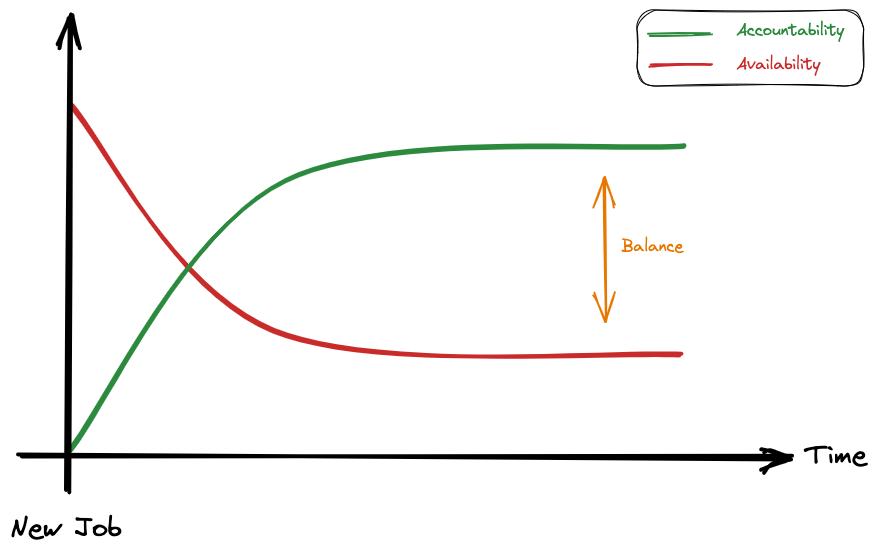Balancing Availability and Accountability in Remote Working
Is being available a bad thing in remote working? Should you prioritize accountability over availability?
One of the most common topics in remote working is the debate between availability and accountability. It is often stated that accountability should be prioritized over availability, and that availability can be detrimental to productivity and work-life balance. While I generally agree with this statement, I don’t think it's as simple as choosing one over the other. Today, I would like to offer my perspective on this topic and tell you why I believe availability is just a part of the process to become accountable.
The Pressure to be Always Available
Let's start with the basics. What is availability?
Availability refers to an employee's accessibility and responsiveness during work hours. In remote working, there is a tendency to be always available, such as being online all the time on platforms like Slack. This can lead to burnout and work-life imbalance, so setting clear boundaries is important.
When I first started practicing remote working about 15 years ago, I thought that always being available was the best way to overcome the lack of human interaction in a remote environment. However, I was completely wrong.
The Importance of Accountability
Accountability, on the other hand, refers to taking responsibility for one's actions and being dependable and reliable in completing tasks and meeting deadlines. In remote working, accountability is crucial to ensure that everyone is on the same page, that tasks are completed on time, and that communication is clear.
Finding the Right Balance
When starting a new job, it comes pretty natural to want to be more available, to show up in chats more frequently, and to be more responsive. In fact, when you don’t have a track record and you have no responsibilities yet, these are the few ways to show your good intentions to your manager and colleagues. And in my opinion, there’s absolutely nothing wrong with that.
However, over time, accountability grows as you take on more responsibilities and prove yourself. Ideally, availability should be inversely proportional to accountability, until they become balanced. As you become more accountable, you can be less available and responsive (within reasonable limits).
I believe that finding the right balance between the two is key. So it's not about prioritizing one over the other, but rather about understanding when and how to be available while also being accountable. The debate between availability and accountability is not black and white. It's about finding the right balance, setting boundaries, and growing in accountability over time.
A Good and Balanced Approach to Availability
We previously mentioned that, when starting a new job, it is natural to be more available and responsive. However, over time and while you grow your accountability, it is also crucial to transform the way you are available.
While initially, it is acceptable to be hyper-responsive, availability shouldn’t be about being constantly online. Rather, it should be about effectively communicating your availability. What often creates frustration on the other side, is not the fact that someone messages or calls you and doesn't get an immediate response, but rather the lack of understanding of why you are not responding.
Improve the Quality of your Availability
There are many things you can do to improve the quality of your availability and we could probably dedicate an entire article to that (which I can think about in the future).
But let me give you some examples:
Use a status in your company chat platform like Slack to communicate your availability. This lets others know if you are in a meeting, sick, picking up kids, or working on something important.
Leave a message in a general channel to explain that you will be away for a period of time.
Make good use of your calendar, blocking time not only for meetings but also for other tasks and activities.
Another good practice to improve the general feeling of your presence is to simply say hello:
Greet your colleagues with a good morning message at the start of your workday.
Say goodbye before signing off for the day.
Wish your team a good weekend on Friday afternoon.
Finally, it's important to participate in team activities to strengthen your sense of availability. While remote work may limit in-person socializing, many teams have channels or boards dedicated to more casual topics like memes and jokes. Make an effort to participate in these channels from time to time. Similarly, if there are remote social events or activities planned, attend and show your teammates that you are present and engaged.
These are just a few simple examples of good practices that you can start to follow to improve the quality of your availability without sacrificing your time and risking burnout.
Balancing Availability and Accountability: The Key to Successful Remote Working
When it comes to remote working, finding the right balance between availability and accountability is essential. While being available can be useful to show your dedication in the beginning and shouldn’t be demonized, it's important to set boundaries and prioritize accountability over availability in the long run. It's also important to communicate your availability effectively by setting statuses, blocking time in your calendar, and participating in team activities.
Ultimately, it's not the quantity of your online availability that matters, but the quality of your accountability and how your availability is perceived by others. Therefore, if you want to thrive as a remote worker, focus on clearly communicating your presence and being accountable to your teammates.
✌️ That’s all folks
That's all for today! As always, I would love to hear from my readers (and if you've made it this far, you're definitely one of the bravest). Please don't hesitate to connect with me on LinkedIn and send a message. I always respond to everyone!


